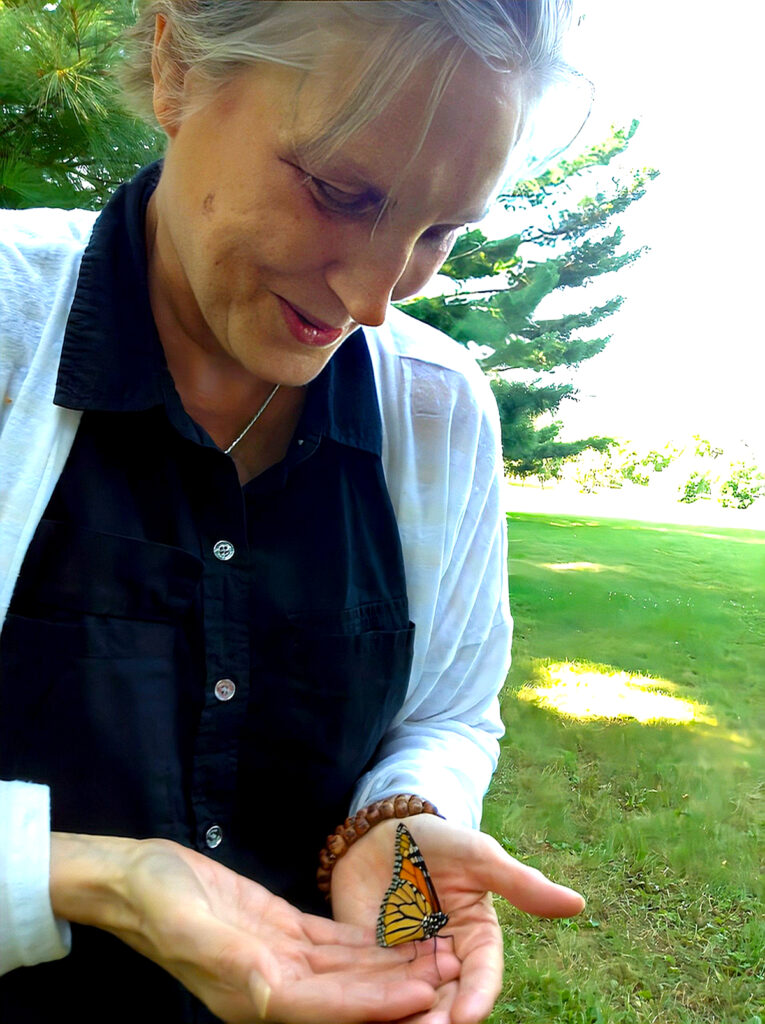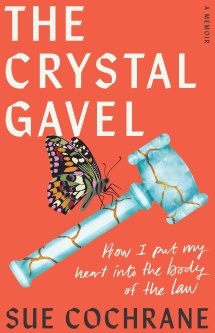Sue Cochrane, author of The Crystal Gavel: How I Put My Heart into the Body of Law
Memoir & Creative Nonfiction Category, sponsored by Bradshaw Celebration of Life Centers
Each week leading up to the 36th annual Minnesota Book Awards, we are featuring exclusive interviews with our finalists. You can also watch the authors in conversation with their fellow category finalists here.


Responses written by Mick Cochrane
What is one detail you wanted to include in this book, but couldn’t find a place for?
As Sue’s brother who worked with her on the manuscript before her death, I was privileged to share many stories of her life, not all of which were included in the The Crystal Gavel. Here’s one I think about a lot. In high school, her senior year, during a meeting with a guidance counselor, Sue summoned all her courage and confessed her dream of one day becoming an attorney. Her guidance counselor apparently didn’t think this was a realistic aspiration for a young woman. “How about legal secretary?” he suggested. This was the 1970s. It was not the first time she’d encountered this kind of sexism—our own father, a successful trial lawyer, had no great hopes for his daughter, as he did for his sons—and it would not be the last. Sue didn’t push back, but neither was she discouraged. She moved forward, undeterred, as she did her whole life, with quiet determination. What was it that Mitch McConnell said about Elizabeth Warren? “Nevertheless, she persisted.” That could have been a fine subtitle for Sue’s story, too.
Tell us about someone who proved instrumental to the creation of this book.
Our maternal grandmother, Theresa Lueck, had a profound effect on Sue’s life story. She was a first-generation German American, one of 12 children, who lived with my grandfather on St. Paul’s West Side in a small house with an expansive garden. She grew and canned vegetables, baked bread, did laundry with homemade soap, raised four children, and said the rosary every night. When our home life was at its worst—our mother sick and depressed, our father drunk and violent—Sue and I spent many days with our grandparents. Our grandmother—a bit like Jody Lulich’s beloved Grace Hooks—gave Sue a kind of unconditional love and acceptance that she never forgot, a healing love that protected and sustained her always. We all need that kind of love, and Sue believed that had she not experienced it at our grandparents, she would not have survived all her life’s challenges, much less written a book describing how she faced and overcame them.
Tell us about a favorite read from the past year. Why did you find it enjoyable, insightful, or memorable?
In her last year, Sue compiled a wonderful list for her sons: “Books That Helped Me Live A Good and Happy Life.” It included everything from Marcus Aurelius’s Meditations to Gandhi’s Autobiography. One of the books on the list was Tattoos on the Heart: The Power of Boundless Compassion by Gregory Boyle. Boyle is a Jesuit priest and the founder of Homeboy Industries, the world’s largest gang rehabilitation and re-entry program. After Sue gave me a copy of Tattoos on the Heart as a gift, I had the honor of hosting Father Greg at the university where I teach and later visited him at Homeboys in Los Angeles. The idea of boundless compassion spoke to Sue’s heart. Father Greg’s most recent book is Forgive Everyone Everything. Based on the title alone, I know Sue would have loved that one, too.

Please tell us something about yourself that is not widely known.
In addition to being a family court judge and tireless advocate for compassionate reform, Sue was a terrific, mostly self-taught, musician—piano, guitar, banjo; you name it, she could play it. While in law school, she played electric bass in a polka wedding band, having learned her parts by transposing the tuba music she found in a book of Whoopee John Wilfart’s polka and waltz music. She loved being part of an ensemble, not center stage, but on the side, making an essential but almost invisible contribution. During her cancer treatment, she found a kind of therapeutic and meditative value in picking out tunes on her son’s electric piano, working her way through a thick book of popular songs she found at Schmitt’s Music, Monster Hits of the 60s and 70s.
Share your thoughts about the role and value of libraries.
When Sue and I were growing up, we often rode our bikes to the West St. Paul branch of the Dakota County library on Emerson Avenue. While I buried myself in books about baseball, Sue read fiction voraciously, from Nancy Drew to Herman Hesse, as well as how-to books on sewing, playing the guitar, various arts and crafts. Afterward, we’d cross the street to where a couple of horses roamed in a large fenced field. We’d pet their noses and admire their gentle power and grace, and somehow those feelings—the quiet of the library, the calm of the horses—blended together as a single memory of peace and refuge from our often chaotic and troubled home life. All her life, Sue read widely, at astonishingly high speed—a book a night wasn’t unusual—and loved libraries and the generous, skillful, and courageous people who staff them.
Sue Cochrane earned a Bachelor of Arts in French and political science from Hamline University and a law degree from William Mitchell College of Law. She served for 18 years on the family court bench in Minneapolis, where she pioneered a holistic and humane approach to conflict resolution.

